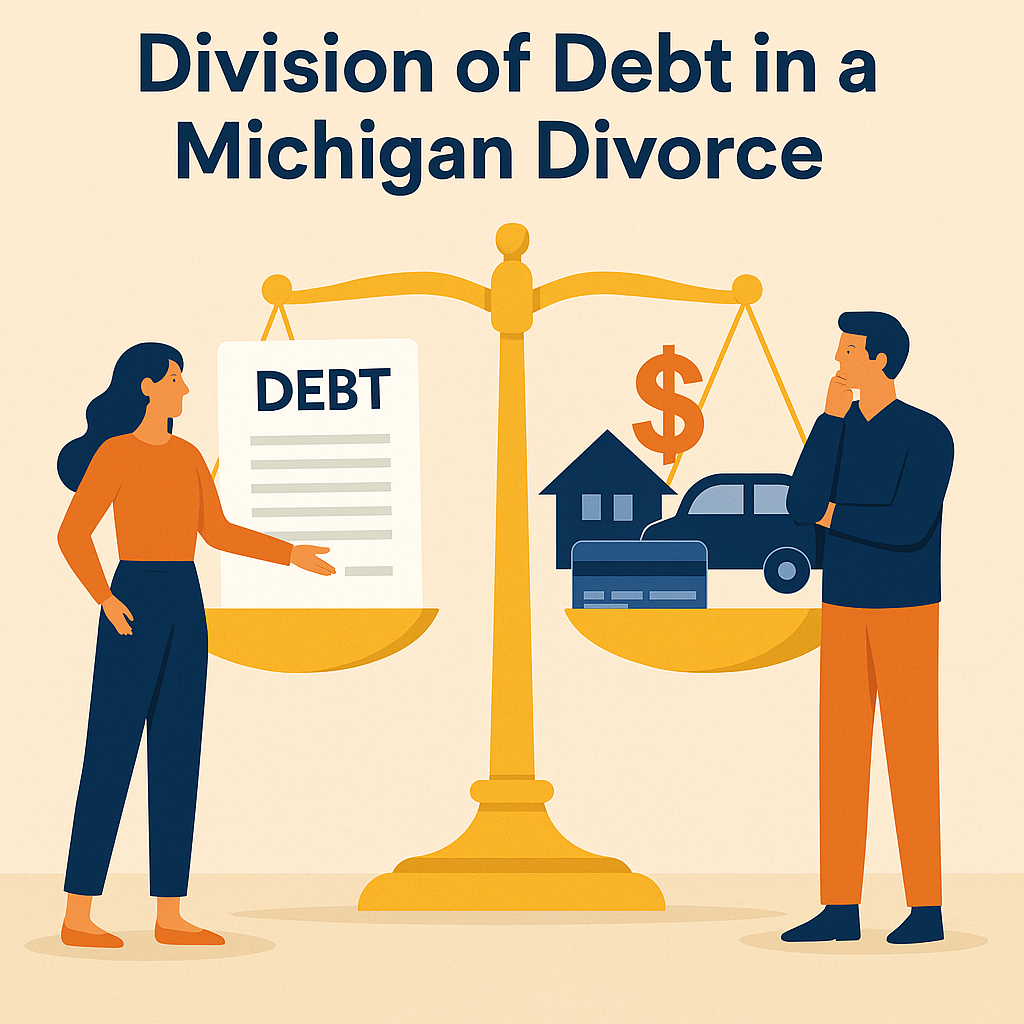Learn how debts are divided in an Oakland County, Michigan divorce. Understand marital vs. separate debts, student loans, tax liabilities, and tips to protect your credit during property settlements.

When spouses in Oakland County go through a divorce, the division of property is not limited to splitting assets like homes, vehicles, and bank accounts. Their debts must be divided as part of the property settlement as well. Understanding how the courts handle marital debts versus separate debts can help you better prepare with your divorce attorney to help plan for your financial future.
Michigan’s Legal Framework for Debt Division During Divorce
Michigan courts must split property “justly and reasonably” based on the facts and circumstances of the divorce. Marital debts are generally treated as “negative assets” and divided along with other marital assets.
What Counts as a Marital Debt?
Similar to how assets are generally considered to be marital assets if they were acquired during the marriage, debt is usually dealt with the same way. Household debts accrued during the marriage are considered joint obligations, even if only one spouse signed the credit agreement. In Oakland County divorces, household debts would be things like credit card balances for family expenses, joint car loans, and household utility bills. Essentially, if the court determines the debt was incurred for the benefit of the household, it will be considered a marital debt and made part of the property settlement. The benefit of the household primarily refers to the usual benefit of household members.
Separate Debts: When One Spouse Bears the Burden
Conversely, if a debt was incurred solely for one spouse’s personal benefit, without the express or implied consent of the other spouse, it may be considered a separate debt. In these situations, the debt will not be part of the property settlement, and the spouse who incurred the debt will be solely responsible for it. Common examples include:
- Gambling or illegal activity debts
- Personal loans where the funds were used solely by that spouse and were never comingled with any joint accounts or used for family purposes
- Credit card charges for an extramarital affair
Special Considerations: Student Loans and Home Equity Loans
Student loans can be treated differently depending on how the funds were used. If the loan was used solely for one spouse’s education, it may be considered a separate debt. If the funds helped pay household bills while one spouse was in school, it may be considered a marital debt.
A home equity loan taken against the marital home is not automatically assigned to the spouse who keeps the home. If the loan proceeds were used for general family expenses rather than property improvements, the court may divide the debt between spouses.
Practical Tips for Debt Allocation in Oakland County Divorces
- Identify all debts – Gather statements for credit cards, loans, and tax obligations and bring them to your attorney as soon as possible.
- Determine marital vs. separate debts – Include how and when the debts were incurred and what the use was.
- Consider debt in support calculations – Courts may deviate from Michigan’s support formula if debt obligations significantly impact cash flow.
Contact our Family Law Attorneys!
In Oakland County, dividing debts in a divorce can be as complex and sometimes more contentious than dividing assets. Because Michigan law gives judges broad discretion to ensure a fair outcome, working with an experienced Michigan divorce attorney is critical. At The Kronzek Firm, we help Oakland County residents, as well as spouses in Livingston County and Macomb County, identify which debts are truly joint obligations, protect you from unfair debt allocation, and safeguard your credit during and after the divorce process. Having an experienced attorney who is familiar with the exceptions and factual nuances involved in marital property division. Contact us today for a consultation. You can send us an email at contactus@kronzek.law at any time.
📞 Our highly respected attorneys have fought for thousands of Michigan clients for more than 30 years. You can reach our Farmington Hills office 24/7 by calling (248) 479-6200.
[Disclaimer: This content is for informational purposes only and does not constitute legal advice. Consult an attorney for personalized guidance.]